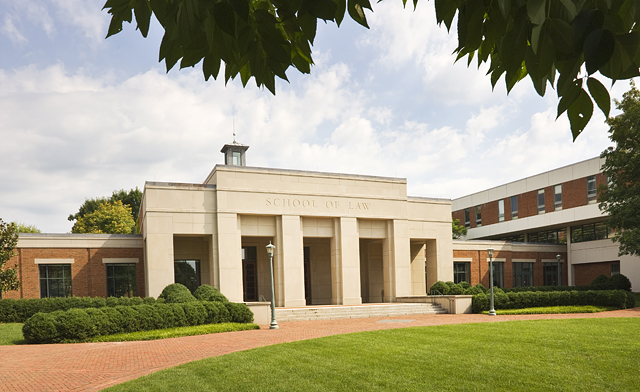Elite law schools in the United States are disproportionately funneling their students into jobs serving fossil fuel clients, according to a new report published Thursday.
The Law Students for Climate Accountability (LSCA) report finds that the top 20 schools have produced fossil fuel lawyers at more than three times the rate of the average law school, based on the US News & World Report’s law school rankings. Nearly half (49 percent) of the corporate lawyers working for the fossil fuel industry, according to the report’s data set, came from one of the top 20-ranked schools.
“The same law schools that sit at the top of the US News rankings serve as linchpins in the production of lawyers who help climate polluters avoid accountability, write the contracts for climate-destroying fossil fuel projects, and lobby against environmental regulations,” the LSCA states.
LSCA, an organization of law students working to hold the legal sector accountable for its role in the climate crisis, has previously scrutinized the top ranked U.S. law firms for their representation of fossil fuel clients. Starting in 2020, the group has published an annual Law Firm Climate Change Scorecard that grades the top 100 U.S. law firms (known as the Vault 100) according to their work for the fossil fuel industry. Since 2017 they have facilitated $1.62 trillion in transactions for the fossil fuel industry and conducted 420 representations in cases exacerbating climate change, according to LSCA.
The LSCA is now calling out top-ranked law schools for their role in propping up the fossil fuel industry through what the report refers to as a “fossil fuel lawyer pipeline.”
“It’s frustrating to see in real time the ways in which schools like mine create a pipeline into work driving climate injustice,” Melissa Kay, a second-year law student at Yale Law School and one of the lead authors of the report, said in a press release. “Why does the legal education system make it so much easier for students to get a job destroying the climate than helping it?”
NEW REPORT: 40+ law schools have withdrawn from the US News rankings, saying it offers a flawed notion of prestige. They're right.
— Law Students for Climate Accountability (@Ls4Ca) March 9, 2023
Our new research shows the top 20-ranked law schools have produced fossil fuel lawyers at *over 3 times* the rate of the average US law school (1/6) pic.twitter.com/ZtzEE0t7Iw
Close corporate ties
The report describes some of the factors that tend to push law students into working for big law firms that service fossil fuel clients. These include the burden of student debt and the relative ease of getting a post-grad corporate law job compared to seeking out lower-paid public interest work. This is often facilitated by the elite law schools, which grant large firms access to students through campus recruiting events, whereas students looking for non-“BigLaw” jobs have to put in more effort in the job search. Those seeking out such jobs must have a “willingness and ability to make far less money upon graduation,” the report adds.
Financial considerations and close ties with corporate or fossil fuel interests may also be behind top law schools’ facilitation of the fossil fuel lawyer pipeline. “Among the schools that produce fossil fuel lawyers at the highest rates, fossil fuel lawyers play a prominent role in the schools’ relationships with donors,” the report notes. “For example, the Chairman of the University of Texas Law School Foundation worked as Vice President and General Counsel of ExxonMobil, while the chair of the Yale Law School Fund is a senior lawyer at Shell.”
The report also points out that some prestigious universities are recipients of Koch cash. The Charles Koch Foundation, which administers donations on behalf of the fossil-fuel-financed Koch family, donated over $3.7 million to New York University, over $1.5 million to Harvard University, and more than $1.18 million to Stanford University, according to the Foundation’s 2021 IRS 990 filing. Tax form disclosures prior to 2019, when the Foundation stopped delineating between university and law school donations, reveal that it gave $400,000 and $343,000 to Stanford Law School in 2017 and 2018, respectively.
“Legal education—and particularly ‘elite’ law schools—have been captured by corporate interests that profit from, among other things, rendering the planet uninhabitable,” said Jon Hanson, the Alan A. Stone Professor of Law and the Director of the Systemic Justice Project at Harvard Law School. “The time is long overdue for those law schools and their BigLaw benefactors to be judged not according to their lofty justice claims or their astronomical wealth but according to their actual consequences here on Earth.”
The report includes several recommendations for law schools to relieve pressures on students funneled into the fossil fuel lawyer pipeline, such as limiting student debt, offering more resources promoting public interest careers, and more academic opportunities in pursuit of jobs in environmental law or renewable energy.
“Many students come to law school with the intention to pursue a public interest career, but are discouraged by the relative lack of institutional support for these pathways,” said Erica Liu, a second-year law student at NYU School of Law and the Research Co-Chair of Law Students for Climate Accountability. “Elite law schools have the power to alleviate many of these constraints—and a genuine commitment to equity and justice requires nothing less.”
Subscribe to our newsletter
Stay up to date with DeSmog news and alerts







